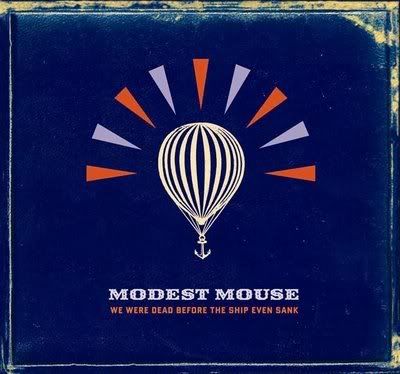 Modest Mouse - We Were Dead Before the Ship Even Sank (2007)
Modest Mouse - We Were Dead Before the Ship Even Sank (2007)No but seriously, Modest Mouse has some of the best song/album titles in rock and roll. Period.
I was working as a Sony college rep when this record came out. It was a HUGE priority for us, one that spanned over several months, and rightfully so. Like I said in regards to Radiohead, it just doesn't get much cooler than Modest Mouse. We were running a photo contest where fans could enter in pictures depicting the album titles (ie- Fly in a Jar, perhaps an actual fly in a jar) A poster needed to be made so they asked us to send in examples that would go on the poster. I was tasked with taking the "Dashboard" picture. I tried WAY too hard to be artistic with this, so one night, I got in my car and put on the record and drove down the 202 freeway to be inspired. I started snapping pictures of myself driving at different angles (which yes, I realize is probably illegal) eventually ending up in the parking lot of a Home Depot somewhere in Mesa, trying to take pictures. Eventually, the photo that was chosen was just one of me with my head on the dashboard in my apartment parking lot, which we found a copy of in the college department a few days ago.
The moral of this story is not only was it completely awesome to work a band like Modest Mouse, but in all the grandness that I tried to express in my "artistic driving down the highway" pictures, just a simple, straightforward head on a dashboard pic was needed. I think that goes for Modest Mouse too. This was far and away their most attainable record, one that came with an intense amount of pressure after their surprise runaway hit with "Float On" on their previous record. The nice thing about Modest Mouse though is that they really didn't seem to let it get to them. This is a band that's been there, done that, and still done whatever the hell they want. In that, they built a solid collection of songs with this record, tight and catchy, jammy when needed to but without some of the experimental stuff that fans had come to know with records like Moon and Antarctica. In fact, it was the best parts of Moon and Antarctica, cleaned up with a side of Johnny Marr.
While Dashboard had modest (ha!) success, it was deeper tracks like "Missed the Boat", "Little Motel" and "Parting of the Sensory" that really stuck out. The band just seemed more in touch with themselves but also with the expectations, finding a nice balence in between. I'm proud to have my face on a poster representing a record like this.
Watch this ENTIRE video. Try not to get choked up.






